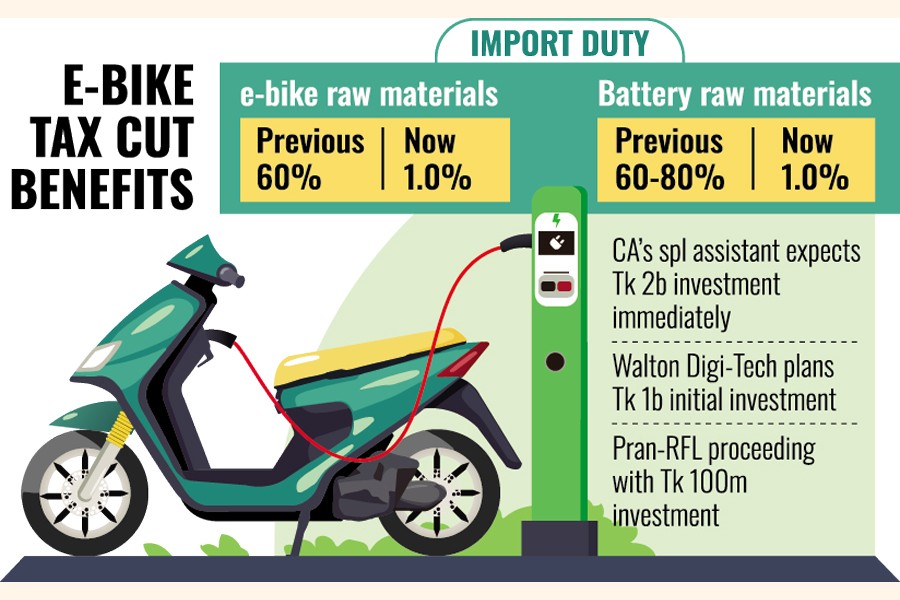
Published :
Updated :

The fiscal incentives on electric bikes (e-bikes) in the new budget have appeared as an opportunity for local manufacturers to make hefty investments to promote environment-friendly vehicles in Bangladesh.
The proposed budget for the fiscal year 2025-26 has offered tax benefits for the production of e-bikes and their batteries.
The average duty on the import of raw materials for e-bikes has been reduced from 60 per cent to 1.0 per cent.
On the other hand, the duty on the import of complete e-bikes remains unchanged at 37 per cent.
However, for some raw materials, 5.0 per cent VAT has to be paid at the import stage. Some other raw materials would enjoy 1.0 per cent.
Officials said the fiscal incentives are aimed at reducing the dependency on fossil fuels and cutting carbon emissions by facilitating local manufacturers to invest in e-bike production.
For the production of e-bike batteries, the import duty on their raw materials has also been cut to 1.0 per cent from the existing 60-80 per cent.
However, imported batteries are subject to 60-80 per cent taxes.
National Board of Revenue (NBR) officials said the fiscal incentives on e-bikes were offered in the budget as per the instructions of the Chief Adviser's Office to meet a component of Dr Yunus' three-zero theory - zero net carbon emission.
Faiz Ahmad Taiyeb, special assistant to the chief adviser, advocated for the incentives to promote the manufacturing of electric vehicles (EVs) as well as lithium and griffin batteries in Bangladesh.
He said the reduction in taxes would bring at least Tk 2.0 billion in investments immediately, expecting the involvement of manufacturing giants like Huawei, Toyota, and Walton.
"The decision will initiate new three-wheeler and e-bike plants here," said Mr Taiyeb, who holds the state minister's status at the Ministry of Posts, Telecommunications and Information Technology.
"I believe in the journey of green EVs. The two statutory regulatory orders (SROs) containing tax benefits will lay a solid foundation and help give the local industry a jumpstart. Moreover, it will help with export diversification too," he told The Financial Express.
He also emphasised replacing lead acid batteries from the so-called easy bikes and rickshaws.
Walton Digi-Tech Industries Ltd's Additional Managing Director Liakat Bhuyian said they are planning to initially invest Tk 1.0 billion in e-bike and its battery production as this sum would be required to comply with the conditions set for availing tax benefits.
"It is a capital-intensive industry and needs a considerable investment to manufacture environment-friendly vehicles," he said.
The fiscal benefits would encourage local production of e-bikes rather than the import of finished vehicles, he added.
Earlier, the tax measures were not encouraging for local production as importing finished vehicles was cheaper, said Mr Bhuyian.
The conditions imposed by the NBR to avail tax benefits are quite well-crafted and local manufacturers would need a well-structured set-up in their plants, he added.
In 2022, Walton started e-bike production on a trial basis. It found that its investment was not feasible as the import of finished vehicles was cheaper due to tax disparities.
The company conducted a market survey and gathered customer feedback in the last one year. It found that importing completely built-up (CBU) vehicles is more cost-effective than producing those locally.
"Now we have a big plan to invest. We will conduct a cost feasibility study after the Eid vacation ends," said Mr Bhuyian.
Touhid Zaman, Deputy General manager public relations of Pran-RFL Group, said they invested Tk 100 million in February last year and are proceeding with an investment of another Tk 100 million to manufacture rechargeable e-scooters, which would start this month on a pilot basis.
"We have an annual capacity to produce 20,000 electric bicycles. Our company has already started exporting e-bikes to Germany."
Pran-RFL started manufacturing e-bikes last year at its Habiganj plant.
So far, urban service holders are the major consumers of EVs, said Mr Zaman.
Mr Bhuyian said an eco-system, including charging stations and public awareness, must be built to facilitate the use of e-bikes and ensure their sustainability to reduce the dependency on fossil fuels.
SM Shoyeb Hossain Nobel, additional managing director of Walton Hi-Tech Industries PLC, said an incentive package for a longer period should be offered to help investors plan their investments.
"This is because we are new in EV production, while other countries like China and Vietnam have already reached a mature stage," he added.
Earlier, the government offered zero tax benefits for promoting "Made in Bangladesh" products and those have successfully substituted imported goods, he said, demanding an investment package for at least five years for EVs.
Battery, motor, and controller production is a capital-intensive industry and needs huge investment, added Mr Nobel.
Some industry insiders alleged stringent conditions have been set for fiscal incentives to benefit a certain group.
Member of NBR's VAT Policy Wing Dr Abdur Rouf, however, refuted the allegations, saying only compliant companies with an industrial set-up should get the fiscal benefits to prevent any abuse of the tax exemptions.
In 1936, the first known mass-produced electric motorcycle, Socovel Electric, was manufactured in Belgium by the Limelette brothers.
The company called Socovel was based in Brussels and gained prominence during World War II due to fuel rationing.
doulotakter11@yahoo.com


 For all latest news, follow The Financial Express Google News channel.
For all latest news, follow The Financial Express Google News channel.